China explores cryopreservation with leading technologies but doubts remain about widespread adoption of technology
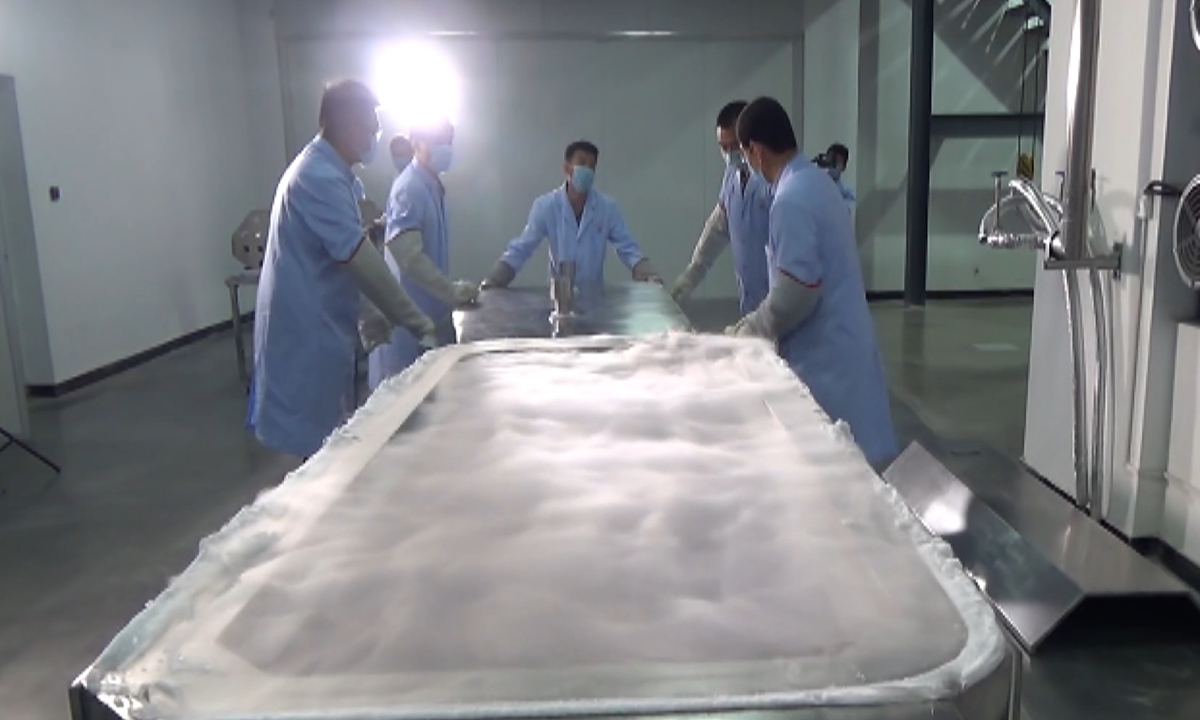
Cryopreservation is operated in Yinfeng company, East China's Shandong Province. Photo: Courtesy of Yinfeng
Gui Junmin has a dream to keep living on, so that someday in the future, he and his beloved wife Zhan Wenlian could meet again.
On May 8, 2017, Zhan was announced clinically dead due to lung cancer in a hospital in Jinan, capital city of East China's Shandong Province.
But this is not the end of the story. Gui has not given up hope.
Zhan's body was immediately frozen with cryopreservation technology in a scientific research institute in Jinan and kept in a storage container with a temperature below -190 C. Under such circumstances, the metabolism of the cells could last 2.4 billion years.
As planned, Zhan would be woken up by future technology someday, which is also expected to cure her sickness. Gui and his son also signed for cryopreservation. The family wishes to reunite again.
Zhan is the first local case of cryopreservation in China. By now, 10 people have gone through cryopreservation in China. Worldwide, the number is more than 400. Only four main companies could currently provide cryopreservation services - two in the US, one in Russia and one in China.
Though for different reasons, these people are pioneers who dare to take the first step of cryopreservation, which is still surrounded by great controversies and suspicions.
The technique triggered widespread discussion in China after a video clip telling the story of Gui and Zhan went viral recently.
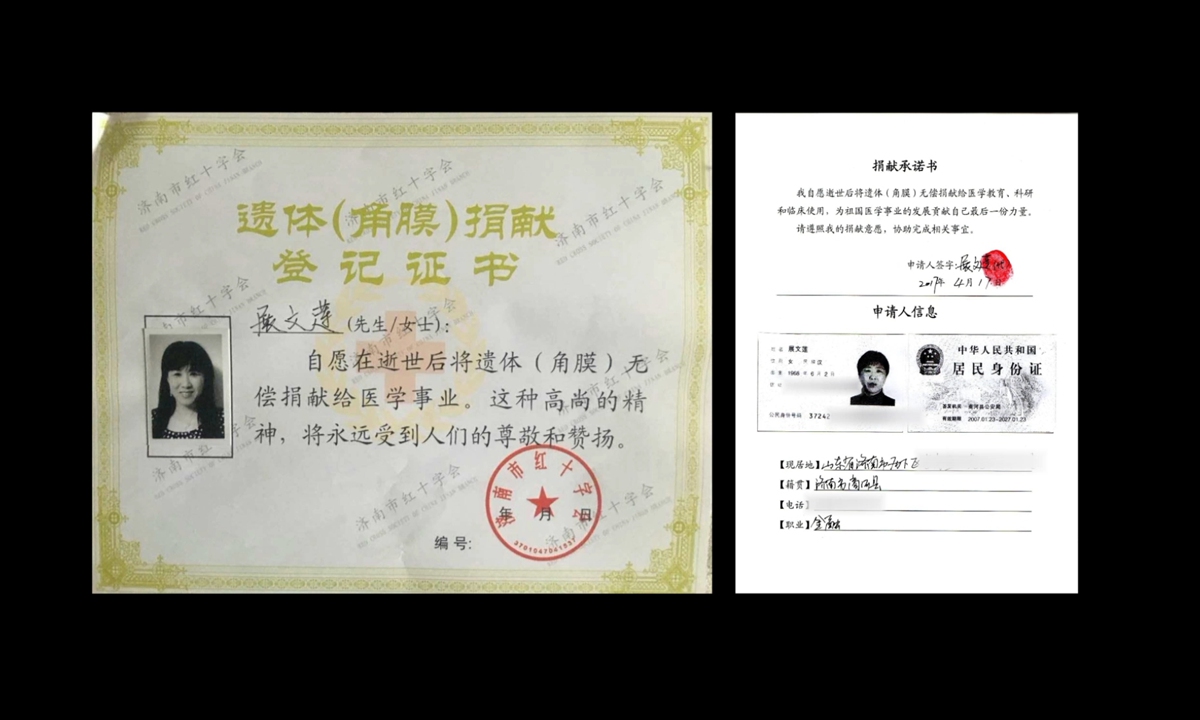
The certificates of Zhan Wenlian donating her cornea and body
China is one of the leading countries in the field, according to insiders. For now, cryopreservation in China is conducted for voluntary donations for medical research, though the process is far from free of charge.
But doubts on technologies and ethical concerns also exist among medical experts. Medical experts reached by the Global Times said that cryopreservation is currently far from an option they would recommend for their incurable patients who are approaching the end of their lives.
The idea of cryopreservation is also against the traditional beliefs of the society - Chinese people believe that a person should be buried for eternal peace.
Some even wonder if immortality will become a privilege for the rich and powerful, obliterating the last thing in the world that is equal for everyone - death.
Preserved for now
For most people, the phenomenon of cryopreservation of the whole body or the head of a person so that he could be resuscitated in the future when the technology is highly developed is only found in sci-fi work. But the technology used for cryopreservation already exists in real life.
"This technology is probably 50 years old already. More importantly, we use this type of technology to cryo-preserve other parts of the body," Aaron Drake, director of Yinfeng Clinical Response Center which conducted Zhan's cryopreservation, told the Global Times.
Drake, a veteran in emergency medicine who used to work for Arizona-based Alcor, another company that provides body cryopreservation services, has settled in Jinan to work with Yinfeng for five years. Yinfeng, an enterprise in real estate industry, turned to the medical field in the early 2000s and is China's only institute to provide cryopreservation services at present.
According to Yinfeng, to preserve the body, the team should intervene within six minutes after the patient was announced clinically dead, during which the patient's brain cells are still active. The team would first use extracorporeal membrane oxygenation, or ECMO, on the patient for cardiopulmonary support (similar to CPR), then they would start to cool the body and inject medications to keep the body healthy.
Afterward, the body is transported to the cryomedicine lab. Yinfeng would previously ask patients to transfer to a nearby hospital in Jinan when their health condition still allowed it.
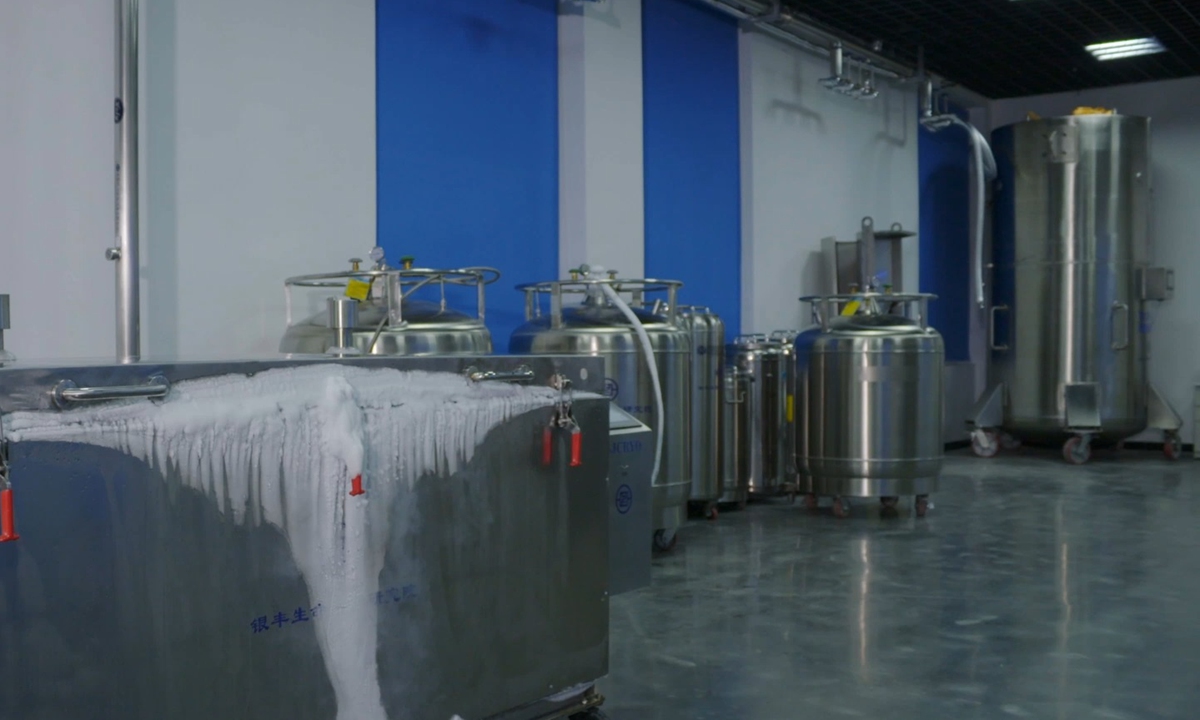
Cryopreservation is operated in Yinfeng company, East China's Shandong Province. Photo: Courtesy of Yinfeng
At the lab, a perfusion operation is conducted to achieve the process of blood replacement and cryo-protectant perfusion, before the slow and accurate process of cooling is performed on the body - it will lower the temperature of the body to -196 C in the next 50 hours.Li Qingping, director of Yinfeng Public Welfare, told the Global Times that the whole process of a cryopreservation could cost 2 million yuan in total, which covers 20 to 30 years of preservation.
Risks and uncertainties
In renowned cult cartoon Futurama, resuscitating a person from cryopreservation is common in 3000 BC. Former US president Richard Nixon even becomes the president of Earth by living in a jar with his head only.
But in reality, when could patients like Zhan really wake up?
According to Drake, a current estimate among the experts is at around 2050, when people believe that "…computers will solve any problem that is presented to them. When you apply that theory to medicine, that means maybe by the year 2050, we can cure any medical disease, including curing and resuscitating these patients."
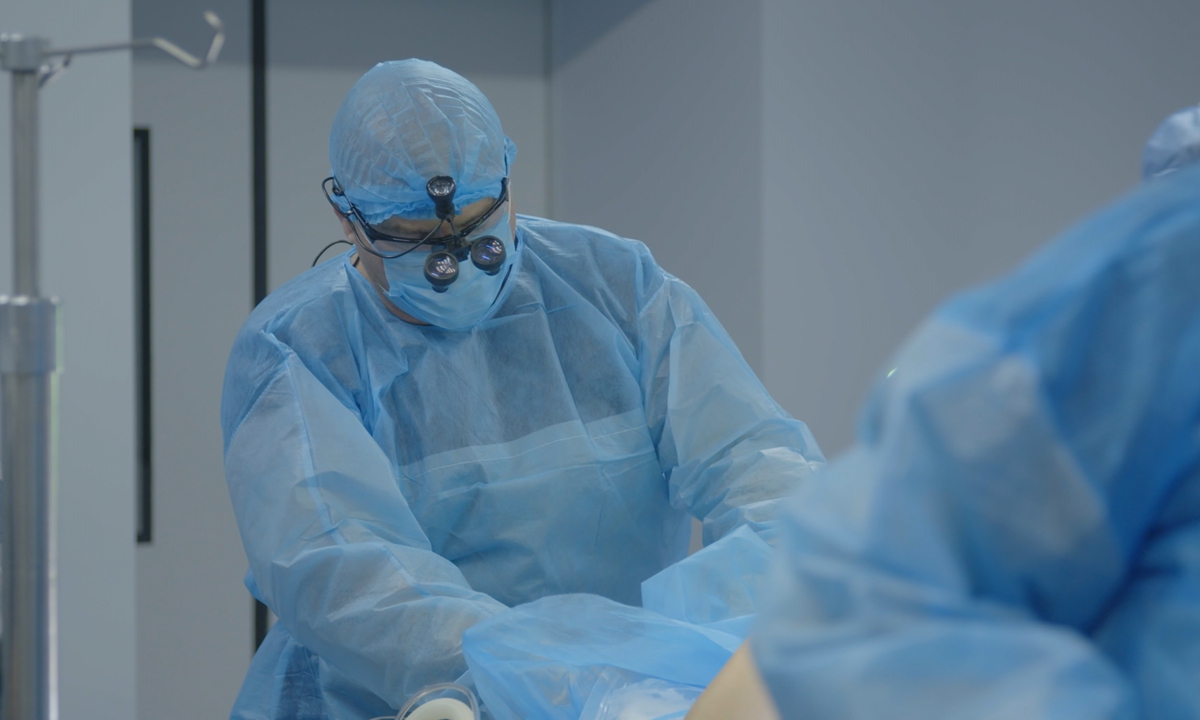
Aaron Drake Photo: Courtesy of Yinfeng
But Drake said he will never give a 100 percent guarantee to his clients on whether the resuscitation will be successful or if the body will be fully functional in the future. "This is still science research. There are still a lot of improvements that need to be made. This process also depends on the development of future technologies."However, Drake believes that the major risks in cryopreservation currently are not the technology, but some external factors, such as the environment of the market of cryopreservation, the government's policies and the level of social acceptance.
In 2015, Du Hong, editor and reviewer of the famous science fiction novel The Three-Body Problem, kept her head in Alcor, becoming China's first donor for cryopreservation.
But Drake noted that Yinfeng would only apply cryopreservation to entire bodies to keep the entire central nervous system intact. The company believes the whole body might be needed during a future resuscitation.
Legal concerns
Many discussions on cryopreservation focus on its legitimacy. Lawyers reached by the Global Times said that China currently does not have laws to regulate the process, as the concept is still ahead of its time.
Lawyer Han Xiao said that the law has a certain degree of lag, and there is no relevant law related to this new technology. However, the civil law field in China follows the principle of "what the law does not prohibit can be done,"-The current law does not prohibit the implementation of cryonics.
"If a citizen has a clear willingness to dispose of his body before death, and does not violate relevant funeral and interment management regulations, the family of the deceased may follow the will to dispose of the body, such as donating the body for medical research," Chen Hao, a lawyer from Shaanxi Dezun Law Firm, told the Global Times.

Photo: Cui Meng/GT
Article 1,006 of the Civil Code of the People's Republic of China stipulates that "a person with full capacity for performing civil juristic acts has the right to make a voluntary decision in accordance with law to donate his cells, tissues, organs, and remains. No organization or individual may force, deceive, or induce the person to donate.""We follow the remains donation regulation promulgated by Shandong Province in 2003. We strictly follow the requirements of the regulations to evaluate the conditions of volunteers and report about the donation together," Li said.
"We have not defined it as a profitable project for commercial operation, but as a scientific research project. However, it is inevitable that you have to deal with the question of investment costs and funds," Li said.
Currently, cryonics has not been commercialized in China, and is still at the stage of medical research. In practice, it is operated by donation of remains to avoid related legal risks. The financial support is provided by the public welfare fund, and the human depositor generally also provides part of the fee as a foundation member, according to Han.
Overseas organizations providing cryonics service generally adopt a membership system. A cryonics agreement will be signed with the custodian and fees will be paid when the person who wants to go through cryonics is still alive, so as to clarify the rights and obligations of both parties, but the organization generally does not make a 'resurrection' promise.
Too early to say?
Not everyone is bullish about the cryopreservation concept.
"It is too early to say whether cryonics is reasonable or even effective," Wang Zheng (pseudonym), an attending doctor in the Neurology Department at Peking Union Medical College Hospital, told the Global Times, noting that although cryonics seems feasible based on principles of biomedical science because it is scientifically logical, to become effective, a medical procedure requires not only principles, but also a large number of sound experimental results.
"At present, medical teams around the world are just getting started with research in this field-scientifically valid research results are really scarce," Wang said.
Wang noted that doctors will never recommend cryonics to the family members of patients who are seriously ill or entering hospice care units, because it violates the current international medical consensus and cannot be considered as a medical method in the diagnosis and treatment guidelines of any medical field.
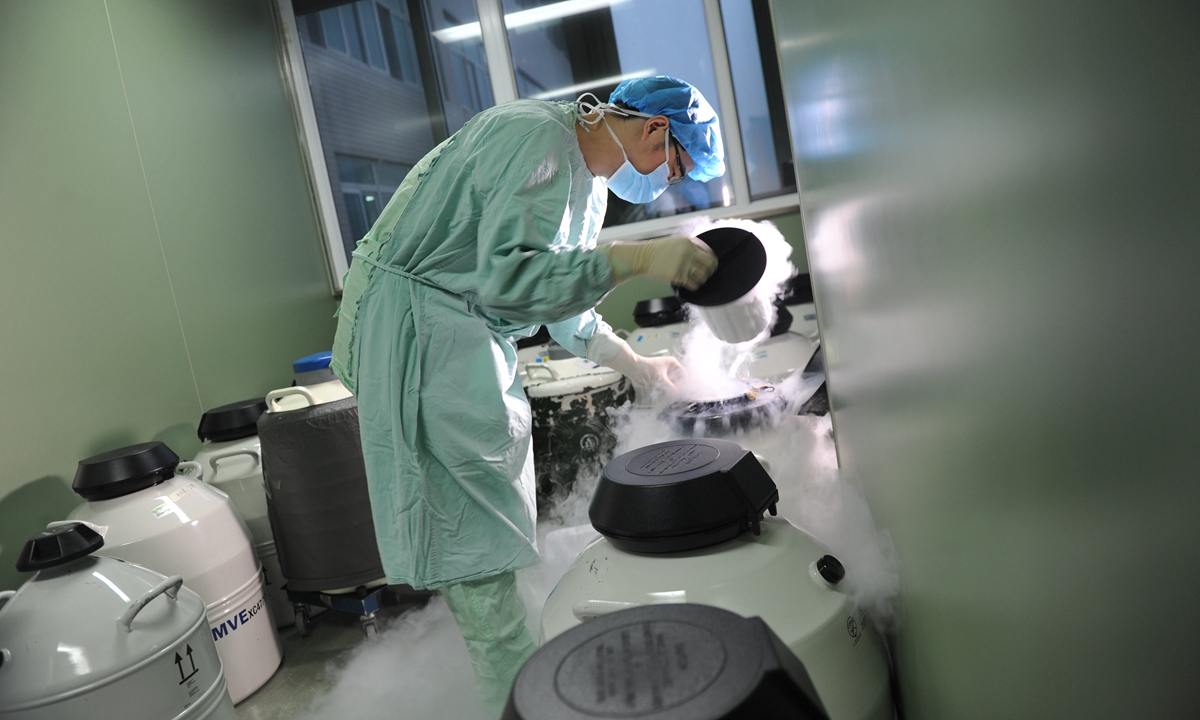
The Reproductive Medicine Center of The West China Second University Hospital of Sichuan University is the largest "test-tube baby" center in Southwest China. Photo: VCG
Price is another issue.
"The average family is certainly not going to pay for such a blank check that can't be cashed," a white-collar worker surnamed Liu from Qingdao, North China's Shandong Province, whose father has terminal pancreatic cancer, told the Global Times that he would never see cryonics as a plan B to save his father's life.
Liu noted he had consulted with Yinfeng about cryonics, but gave it up when he learned that it was expensive and had not been successful so far.
"This approach is fraught with too much uncertainty," Liu said.
There are also detailed discussions about the concept. For instance, on the internet, some people think that the technology underestimates the complexity of the human body and those who are frozen may not be able to become alive ever, while others ask whether the soul will ever leave the frozen body.
"People will only have a strong desire to live when they know that they are going to die. It's more important to cherish each day and live it well," a netizen said.
Drake, who has worked with other companies that provide the service around the world, believes China is leading the world in the field of cryopreservation. He is optimistic about the development of cryopreservation in the country.
"Some people have lived a very long life and have been very happy with their life. And they say that's enough. Some people's life is cut short by cancer, by accidents. They really have not had that opportunity for a full life," Drake said, "This provides them with an opportunity to maybe experience that."

